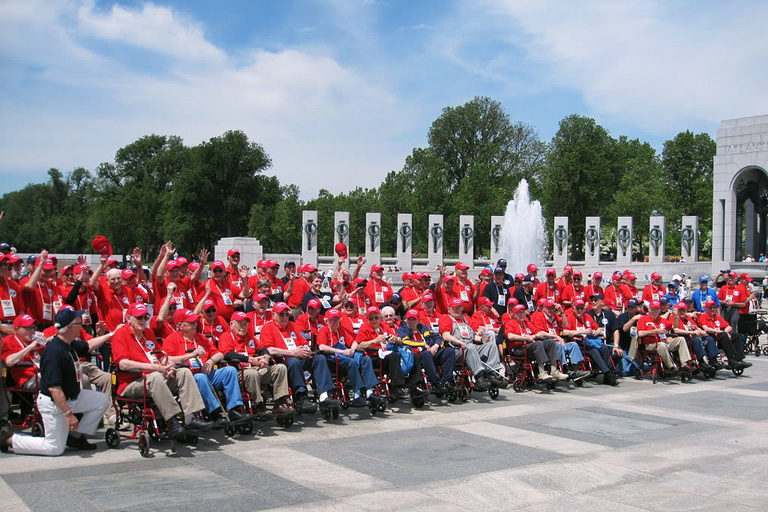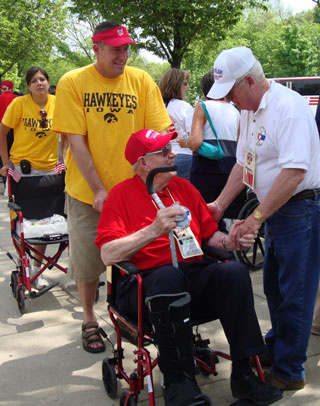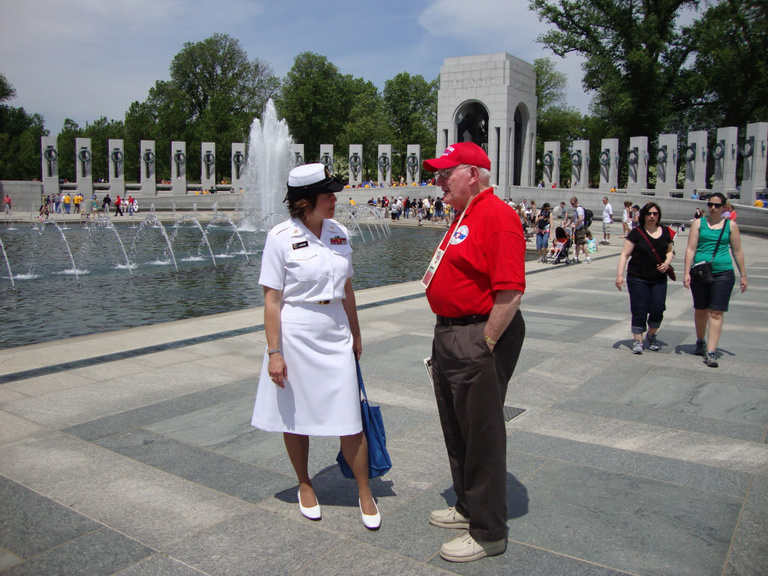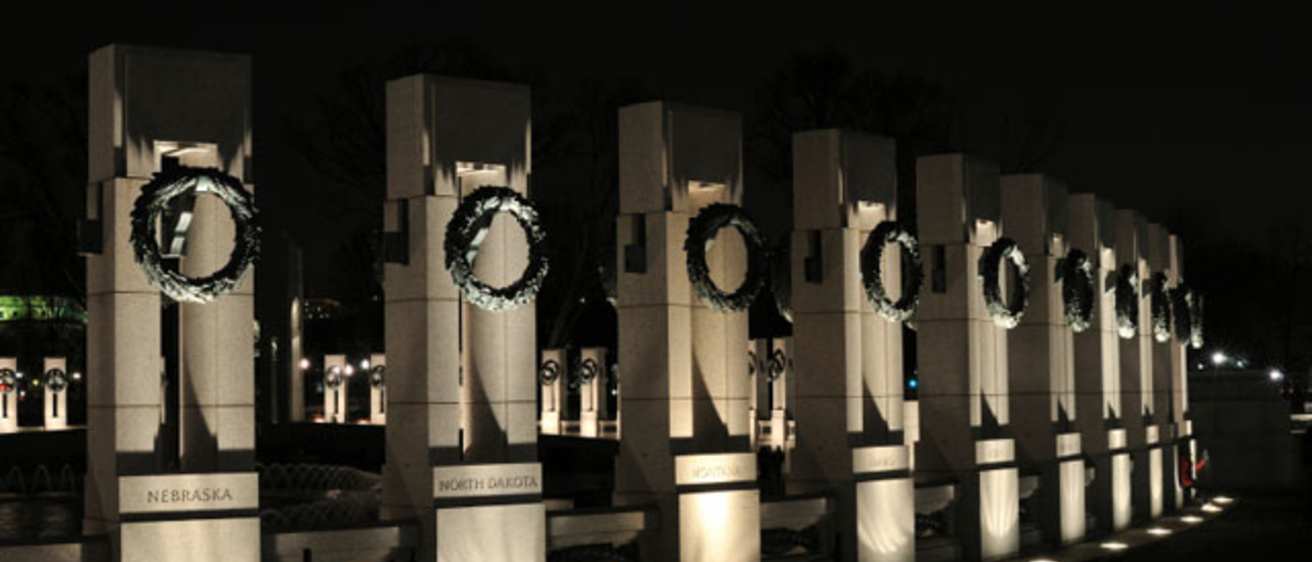Clare Kelly got the idea from her hometown newspaper back in Iowa.
“I was reading the Fort Dodge Messenger and saw an article about communities raising money to send World War II veterans on the Brushy Creek Area Honor Flight to Washington, D.C.,” says Kelly (B.A. ’94), executive director of government affairs for Children’s National Medical Center. “I thought, ‘There must be something D.C. alumni can do to support this.’”

And so, in May 2010, about 75 UI alumni turned out at Washington’s World War II Memorial to give the Iowa vets a black-and-gold welcome, sparking a new tradition for the Capital Area IOWA Club. Since then, club members have greeted about 25 flights from Iowa, each carrying 85-100 veterans.
The Iowa flights are part of a national movement to help aging veterans visit the World War II Memorial, which was completed in 2004. The Honor Flight Network and its regional hubs coordinate the trips, which are completely free to participating veterans.
For some Hawkeyes, the program has become a passion.
Living history
Maria Temiquel (B.A. ’89), who works with the Department of Labor’s Veterans Employment and Training Service, jumped at the chance to volunteer. She’s a World War II history buff, and meeting some of the men and women who experienced the conflict firsthand has made an indelible mark on her life.
“They were rock stars to me. Meeting my first plane, I was so excited I could barely breathe,” she says. “I get that same feeling almost every weekend when I go out to the airport.”
IOWA clubs offer alumni camaraderie and more
On any given football Saturday, expect upwards of 100 Hawkeyes to crowd a Washington haunt and watch the game together. That kind of camaraderie has earned the Capital Area IOWA Club top honors from the UI Alumni Association for 12 years running.
“We’re a close group of people who still love flat land and corn,” says Kevin Meredith, one of nearly 400 active club members.
There are currently 56 IOWA Clubs in 32 U.S. states, plus 15 abroad. Affiliated through the UI Alumni Association—which regularly recognizes top clubs, programs, and volunteers—each club has its own unique character.
The D.C. club’s mobilization in support of honor flights provides a model for what clubs can do when they rally around a cause.
“They’re not only doing something that connects people to the University of Iowa—they’re doing something that makes life better for other people,” says Vince Nelson, Alumni Association president and CEO. “That’s what alumni engagement is all about.”
Temiquel greets flights from all over, not just Iowa. Like other volunteers, she often helps escort the veterans, each of whom is assigned an accompanying “guardian” for the duration of the daylong visit.
She spent one of her most memorable days with a man from Wisconsin. He kept brushing off the local news reporters who accompanied the flight and wanted to interview the vets. Eventually, he told his story just to her.
“He was on the U.S.S. Indianapolis,” Temiquel recalls with reverence. The ship was torpedoed after delivering atomic bomb parts to a U.S. air base in the Pacific. It sank, taking about a quarter of its 1,200-man crew with it. Ultimately, only 317 survived days of exposure, starvation, and other threats.
“This man watched shipmates being eaten by sharks,” Temiquel says. “He told me he kept thinking about the 30-day leave he’d get for being on a ship that was shot. He said he survived because he was determined that no one, no thing, was going to take away his leave.”
It’s not uncommon to hear veterans talk about things they haven’t discussed in decades, if ever.
“Family members will write after and say, ‘He never spoke of this,’” Temiquel says. “Another thing I notice—when we tour the memorial and see the names of battles commemorated there, the veterans’ stories always return to the friends who didn’t make it back.”
Paying respects
Joe Rozek (B.A. ’73) got the call. A World War II vet named Vince Blank was headed in on an honor flight, and he wanted to visit the grave of his daughter, who died as an infant while Blank was stationed in D.C. after the war.
The girl was buried in Arlington National Cemetery. Could Rozek find the gravesite and guide Blank there?
“I located the grave, got passes to the cemetery, and picked up a couple of roses from Fort Meyer,” Rozek recalls. “We met at the cemetery gate, and he got to spend some time with his daughter.”
Last fall, Rozek received word that Blank had died, but that he’d also told the folks back in Vinton, Iowa, how much that time at his daughter’s grave had meant.
Rozek has helped other veterans detour from the standard visit route on deeply personal pilgrimages. He once escorted a Marine who, immediately after the war, had guarded a Japanese admiral on trial for executing a group of American prisoners. The visiting vet wanted to see the Arlington site where the Americans are buried together. “I just spent some solemn time with him here,” Rozek says.

Rozek doesn’t expect the veterans to discuss their experiences. He’s a soldier himself, a U.S. Army Special Forces officer medically retired in 2003, so he knows that sometimes you just don’t talk about the things you’ve done or seen.
But even if they don’t so say out loud, many veterans seem changed by their honor flight experience. “It often does feel like they’ve reached a type of closure,” Rozek says.
Working together
“We hear that the veterans tend to chat like kids all the way back home,” says Kevin Meredith (B.S.E. ’01), who works with Microsoft in D.C. and has guided visiting vets around the capital. Conversation isn’t the only highlight once the planes steer back to Iowa.
“Mail call was such a big part of their lives in the service,” Meredith says, “so on the flight back they get one more mail call—letters from their families and communities.” Sometimes entire grade-school classes write letters. Other times, volunteers write to vets who have no family left, determined that everybody gets a message of support.
Mail call symbolizes the community effort that goes into every single honor flight—from the bake sales and pancake breakfasts that raise funds, to the late-night welcomes that greet returning flights with cheers and marching bands.

“Those of us who show up out here, we’re just a small part of something that’s been going on for months,” Meredith says.
Capital Area IOWA Club volunteers often coordinate with counterparts in D.C.’s Iowa State University alumni group, injecting some friendly rivalry into the project. They turn out with flags and banners, and help make sure vets get their pictures taken at the World War II Memorial’s Iowa column.
“Some of the veterans seem kind of amazed at how many of us remember our Iowa roots and still cheer the Hawkeyes,” Meredith says.
Meanwhile, locals and tourists alike approach the veterans to take photos or convey their appreciation.
During one visit, Clare Kelly met a woman who’d grown up in the Philippines under Japanese occupation and remembered the American troops as liberators. She came to the memorial to meet the veterans, the woman said, because she realized it would be her only chance to thank them.
“I had to simply thank her and keep moving,” Kelly says. “Otherwise I might have broken down.”
Answering the call
“It’s striking how many more wheelchairs you see as the years go by,” Rozek says, noting a fact that other volunteers also acknowledge: the World War II generation’s time is drawing to a close.
Some honor flight hubs have begun transporting veterans of U.S. wars in Korea and Vietnam, but the focus remains largely on giving World War II veterans their due.
“These were young men who came home and went straight back to Iowa,” Temiquel says. “They didn’t go off to the big city. They went to work, had families, and built the middle class.”
Rozek’s own father fought in World War II. “We never really discussed it,” he says. “But my dad did instill his patriotism—he’s why I went through Iowa’s ROTC program in the late 1960s, which wasn’t necessarily easy at the time.”
For Rozek, meeting other veterans is an extension of that duty.
“My parents came from that generation,” Rozek says. “In some way, I feel like I owe them this.”
